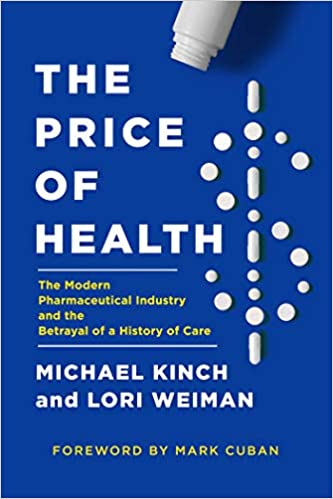The Price of Health

Full Title: The Price of Health: The Modern Pharmaceutical Enterprise and the Betrayal of a History of Care
Author / Editor: Michael Kinch and Lori Weiman
Publisher: Pegasus, 2021
Review © Metapsychology Vol. 25, No. 16
Reviewer: Christian Perring
There are many books about why the pharmaceutical industry is in the state it is. The notable features are that a great many prices for medications are very high, and very few new notable medications are being developed. Instead, there is far more focus on developing very slightly different versions of medications that are already available. It seems that it is all about maximizing profit and very little about working for public health. Indeed, there are some cases where pharmaceutical companies seem to work against public health, quashing innovation in bringing new helpful drugs to market. It is easy to come to the conclusion that it is an industry that likes the population to be ill, since that is best for the industry profits. It is very easy for people who have been noting the trends over recent decades to start railing against Big Pharma, as if there were a conspiracy against public health.
Here are some of the books about the state of the pharmaceutical industry and the healthcare industry more generally, in no particular order:
- Drug Wars: How Big Pharma Raises Prices and Keeps Generics off the Market, by Robin Feldman and Evan Frondorf. Cambridge University Press, 2017.
- Drugs, Money, and Secret Handshakes: The Unstoppable Growth of Prescription Drug Prices,by Robin Feldman. Cambridge University Press, 2019.
- The Price We Pay: What Broke American Health Care–And How to Fix It, by Marty Makary. Bloomsbury, 2019.
- An American Sickness: How Healthcare Became Big Business and How You Can Take It Back, by Elisabeth Rosenthal. Penguin Books, 2017.
- Generic: The Unbranding of Modern Medicine by Jeremy Greene, Johns Hopkins University Press, 2014
- America’s Bitter Pill: Money, Politics, Backroom Deals, and the Fight to Fix Our Broken Healthcare System, by Steven Brill. Random House, 2015.
- Priced Out: The Economic and Ethical Costs of American Health Care, by Uwe E. Reinhardt. Princeton University Press, 2019.
- Bottle of Lies: The Inside Story of the Generic Drug Boom, by Katherine Eban. Ecco, 2019.
- Pharma: Greed, Lies, and the Poisoning of America, by Gerald Posner. Avid Reader Press, 2020.
These titles give a good indication of the problems that authors see. It is rare to find a book with much positive to say about the pharmaceutical industry. The Price of Health is no exception.
Authors Michael Kinch and Lori Weiman are well acquainted with the pharmaceutical industry. They set out a dense explanation of how the industry has been changing and adapting to both market forces and government regulations. They highlight how, ironically, the various policy efforts to control the rise in costs have generally been used as opportunities to increase prices.
The book has some history of the pharmaceutical industry around the world. It isn’t an easy story to tell since so much has happened at various levels, and so it is a challenge to provide a narrative thread to tie events together. It is hard to step back far enough to get perspective. But the authors do make an effort to keep it manageable. They also try to keep it lively with funny section headings –e.g. “I Fought the Law (and the Law Won)” — and some stories of colorful individuals.
But there’s no getting around the mass of detail. This is a long book. The audio version takes 14 hours to perform, and that’s without the many pages of references. Readers have to be determined to get through it.
The authors are not particularly in favor of more government regulation as a solution to the problems of rising prices, since these efforts tend to backfire, at least in the USA. Other countries are more successful at reducing the rise in costs.
If the authors do have a recommendation, it is for more transparency in the pharmaceutical industry. Companies are extremely secretive about pricing and their decision-making procedures. Kinch and Weiman repeatedly push the idea that sunlight is a disinfectant — i.e., there would be more accountability if the general public knew more about what goes on in the industry, and this would help it serve the public better.
The secrecy and lack of accountability of the pharmaceutical companies leads many to distrust them. Of course, some of the obvious failures of the industry, both in selling medications that turned out to be harmful, and its unwillingness to supply medications which are helpful which don’t make a profit. The Price of Health on the whole does provide a good deal of reason for suspicion of the industry, and to reject many of the self-justifications the industry has proffered.
Of course, medications can have beneficial effects, and The Price of Health is committed to the idea that medications are an important part of health care. The goal of the authors is for medications to be more affordable and available. Readers who favor the view that we rely too much on medications and we should be looking to other forms of health maintenance to reduce our use of medications will need to look elsewhere.
The Price of Health will be mainly valuable to those who want a greater understanding of the pharmaceutical industry and its role in medicine. While some of the information it provides is readily available elsewhere, it is distinctive in going into more detail than most other comparable books.
Christian Perring is President of the Association for the Advancement of Philosophy and Psychiatry.
Categories: Medications
Keywords: pharmaceutical industry
